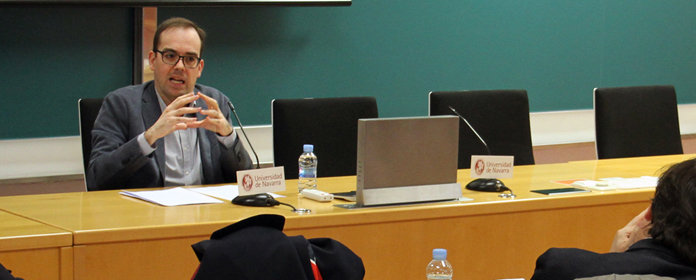La libertad religiosa a través de la historia, el tema de un workshop del Instituto Cultura y Sociedad
La sesión forma parte de una investigación del proyecto ‘Religión y sociedad civil’ y cuenta con financiación del Ministerio de Economía y Competitividad

FOTO: Manuel Castells
La libertad religiosa y la separación Iglesia-Estado tal y como las conocemos actualmente han sido posibles gracias a las narrativas construidas a lo largo de los siglos XIX y XX. Así lo expone, Rafael García investigador del proyecto ‘Religión y sociedad civil’ del Instituto Cultura y Sociedad de la Universidad de Navarra. El experto ha organizado el workshop ‘Libertad religiosa y relaciones Iglesia-Estado en los siglos XIX y XX’, donde se han analizado estas narrativas.
Según el organizador, estos relatos consiguieron mediar entre las dos narrativas existentes en estos siglos: la liberal, “que afirmaba la incompatibilidad entre catolicismo y libertad religiosa”; y la “contra-narrativa confesional católica que veía en la libertad religiosa una amenaza para la religión”, explica.
Tal y como afirma, surgió una ‘tercera vía’ entre autores cristianos de tendencia liberal, como Tocqueville, que “realizaban una interpretación diferente de la narrativa dominante liberal para poner de manifiesto la compatibilidad entre el catolicismo y la libertad religiosa”.
Durante el workshop se han analizado los discursos en defensa de la libertad religiosa en distintos puntos de Europa y América, como España, Francia, Estados Unidos y México, en los siglos XIX y XX. “En países como México, los católicos defendieron la libertad religiosa frente a gobiernos que la negaban”, explica García.
Algunas de las ponencias del workshop fueron "Libertad religiosa en México: conflictos en la narrativa", de Carmen Alejos; “La civilización cristiana y el mundo musulmán en Tocqueville”, ofrecida por el organizador; o "Conflicto de narrativas católicas en torno a la libertad religiosa: España y Estados Unidos", de Rafael Escobedo.
Religión. Historia y actualidad“En la actualidad, existe una variedad enorme de soluciones institucionales en Europa,-expone el investigador- pero en todos los países la libertad religiosa se reconoce como un derecho que debe ser garantizado”. Así, a pesar de la separación Iglesia-Estado, existen estados considerados confesionales “compatibles con un régimen de tolerancia religiosa”, como es el ejemplo de Inglaterra.
La separación de política y religión no ha minimizado el impacto de los distintos cultos en la sociedad occidental y Europa sigue bebiendo de sus raíces cristianas. Esto se refleja en la celebración pública de festividades religiosas, el restudio de religión en los colegios públicos y el impacto de asociaciones dependientes de la Iglesia “como Cáritas” en la sociedad, enumera García.
Esta investigación se desarrolla en el subproyecto ‘Narrativas en conflicto: libertad religiosa y relaciones Iglesia-Estado en los siglos XIX y XX’, enmarcado en el proyecto ‘Religión y sociedad civil’ y cuenta con financiación del Ministerio de Economía y Competitividaddel Gobierno de España (Ref. DER2016-76619-P).




